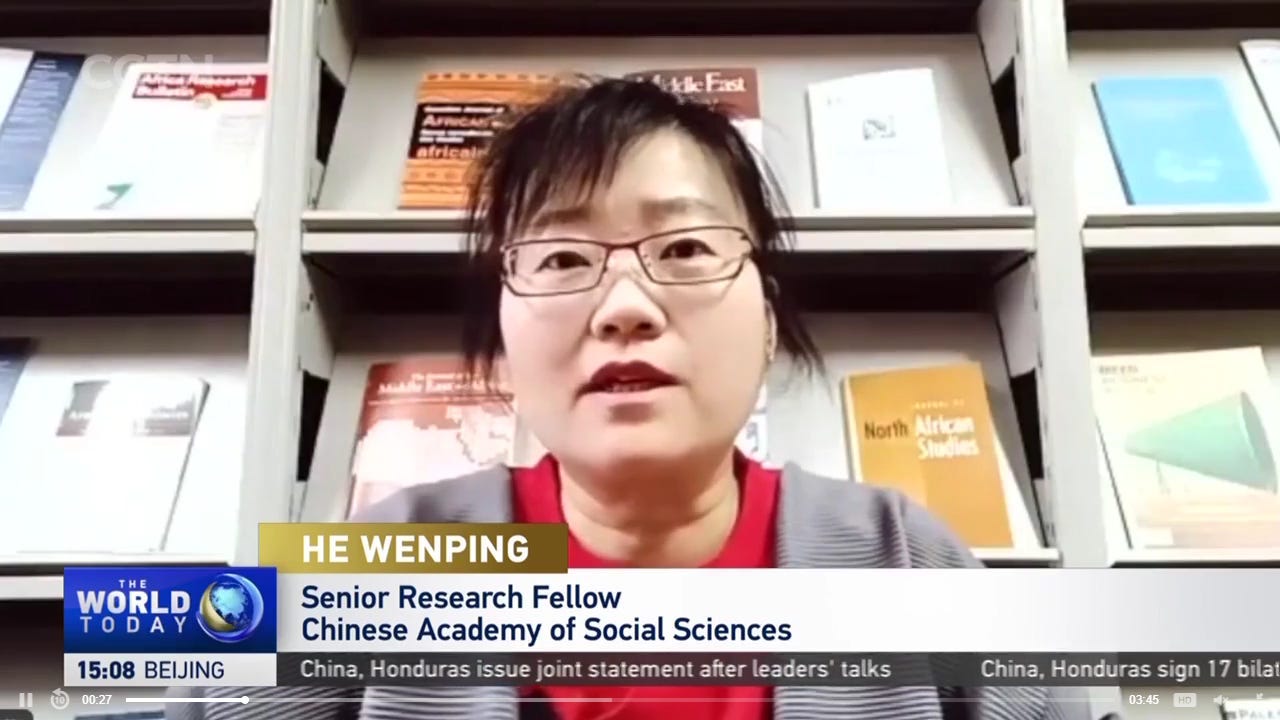Dr. He Wenping - Professor and Research Program Director at the Institute of West-Asian and African Studies (IWAAS) at the Chinese Academy of Social Sciences (CASS) - disagrees with the notion that China favors the Palestinians over Israel.
The transcript of Dr. He Wenping’s interview at CGTN June 13, 2023.
Can you elaborate on China's position on the two-state solution, and how the Global Security Initiative (GSI) proposed by Chinese President Xi Jinping could help?
He Weiping: “China's stance on theIsrael-Palestine issue has always been clear and consistent. Ten years ago, in 2013, President Xi Jinping put forward China's four-point proposal for resolving the Palestinian-Israeli dispute. We support the two-state solution and a Palestinian state, based on the pre-1967 borders, with East Jerusalem as its capital. For China, this policy hasn't changed.
“Western media are saying that China is against Israel and supports Palestine. I don't buy that idea. In fact, we have maintained good relations with both countries, Israel and Palestine. We have great scientific and research cooperation with Israel...creating a more peaceful environment in the Middle East benefits the Israeli people as well.
“…So long as the two-state solution issue is not fundamentally resolved, the Israeli and Palestinian people will have no security or sense of security.”
Palestinian President Mahmoud Abbas is China's first Arab head of state this year. How do you see this and what are the expectations from this visit?
“Abbas' visit to China, I think, demonstrates clearly that China now attaches great importance to mediating existing conflicts in the Middle East, given our past experiences, such as [brokering] peace between Saudi Arabia and Iran...This reconciliation between so-called "old foes" is, in my opinion, a step in the right direction.
“Of course, this visit is about more than just peacemaking. It also focuses on how to develop the China-Palestine bilateral relationship. Abbas is an old friend of China.
“In addition, it shows how the China-Palestine relationship has a very strong foundation, and we foresee the signing of a number of cooperation agreements to further strengthen Sino-Palestinian overall cooperation. That would be a good outcome for President Abbas' visit.”
Linked to the above discourse is this interview (in Chinese) with Wu Bingbing (吴冰冰), the head of Peking University’s Institute of Arab and Islamic Culture, who provides some interesting insights into China’s overall strategy in the Middle East in the context of US-China rivalry as a component in China’s diplomatic strategy:
…….. always be faced with the following situation: although we will make friends with everyone, the timing will differ [虽然都交朋友,但有一个早晚]; although we will promote cooperation with everyone, this won’t be able to be done in the same way [都推动合作,但不可能完全一样]. These are normal problems that we will inevitably be faced with when pursuing balanced diplomacy.
“However, in order to foster stronger relations with these countries, we need to encourage 'positive balancing' [积极的平衡].So what does ‘positive balancing’ actually mean?
It means that our cooperation with one party will certainly put some pressure on another party, but that it is precisely this pressure that will help boost cooperation between this other party and us. Turning pressure into incentive, that is [the meaning of] positive balancing.”
“Negative balancing, on the other hand, is when we limit our cooperation with one party for fear of affecting another party, which in turn leads to increasingly restricted areas of cooperation.”
“For example, China has signed a 25-year cooperation agreement with Iran, but there has been no similar agreement signed with the Gulf countries. There is therefore a certain amount of pressure on the Gulf countries which [now] have an incentive to further their cooperation with China, such as expanding [bilateral] investments and expanding trade in energy resources.Not long ago, Qatar signed a 27-year gas deal with China. Hasn’t this [aforementioned pressure] achieved its effect? Iran is also a country rich in natural gas reserves – even more so than Qatar – but China and Iran haven't reached that level of cooperation with each other yet!
So, it is a sort of two-way balance. Through this ‘positive balancing’, China can help drive the continuous improvement of its relations with all parties relatively effectively.”
Related Readings
China relations with the Middle East
This is the second blog of a trilogy on Palestine; the first script is HERE.



